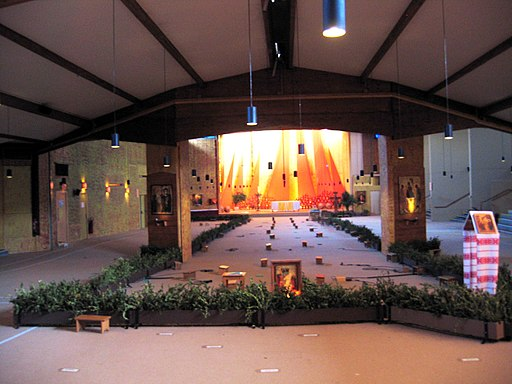This post features a story from The Rev. Matt Short, Director for Evangelical Mission, Greater Milwaukee Synod.
In July of 2016, as a part of a three-month sabbatical, I had the chance to spend a week at the Taize Community in France. Three times each day, I would kneel on the floor of the Church of Reconciliation with thousands of others from across the globe as we sang and prayed with the brothers of the community. Three times a day, the cavernous sanctuary became, for me, a place of reflection, peace, and deep contemplation. It was the first time I personally experienced the truth behind Jesus’ words in John 7:38; “…out of the believer’s heart shall flow rivers of living water.”
 |
The Church of Reconciliation,Taizé, France
|
When I first returned to the United States and emerged from sabbatical to begin active ministry again, I felt a sense of sadness that this beautiful sanctuary was so far from me. It didn’t take long, however, for me to realize that what I longed for wasn’t the physical structure of the Church of Reconciliation; it was the space created in my life by the rhythms of the sabbatical. That space is what allowed for the depth of reflection that felt to me like a river of living water. I soon realized that I could create a “sanctuary in time” by simply slowing down enough to ask deep questions and hold the space for reflection I deeply needed.
I am convinced that in our harried pace of daily ministry, exacerbated by the disorienting effects of the Covid-19 virus, space for reflection is one of the first things to go. For me, it is also at times like this that I need that “sanctuary in time” the most. Recently, I, along with several colleagues, facilitated a conversation in which we held that space for reflection.
There was nothing particularly profound about the process we used or the questions we offered as a frame for the reflective time. However, I am convinced that the brilliance lies in the simplicity of clearing a space in time and using open questions to open us to the movement of the Spirit.
During that time of reflection, we asked these questions:
As you think about your ministry during this time of pandemic:
- What do you notice? (Spend 5 minutes thinking or writing just about this.)
- What questions are emerging for you? (Spend another 5 minutes thinking or writing just about this, and avoid the temptation to answer any of the question. Just make a list of them.)
- What might God be nudging you to consider? (Spend 5 minutes thinking or writing just about this.)
The simplicity and open nature of the questions, along with the time set aside, acted as our sanctuary that day. This held open the space for us to let go of the drive to be productive for just a bit and listen to the leading of the Spirit. We then used the reflections as a springboard to innovation by following God’s “nudging” and identifying one new thing we could try.
A month after facilitating this time for reflection, we returned, asking the simple questions again:
- What new action did you try?
- What did you notice?
- What questions are emerging for you?
- Now, what might God be nudging you to consider?
The key, at least for me, has been the commitment to regularly holding space for reflection. I have found the regular practice of this simple process, whether alone or with others, acts as a sanctuary in time, allowing for the living water that’s always just beneath the surface to burst forth.
The ELCA Innovation Lab Blog is new! We’d love to hear what you think. If you’ve got a few minutes, complete this short survey. If you have any additional questions or comments let us know at lab@elca.org.
